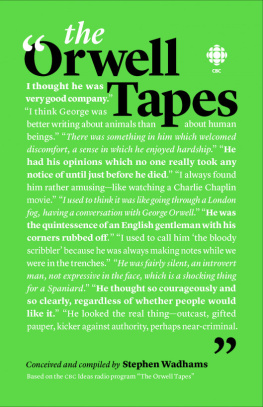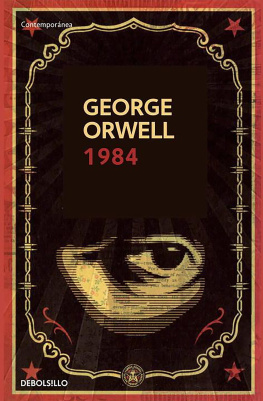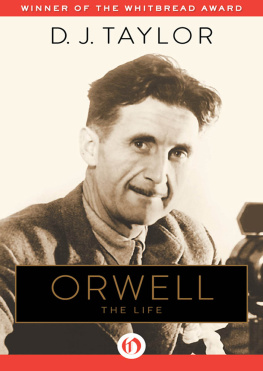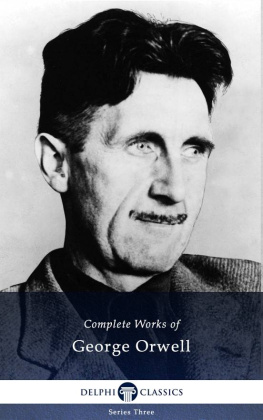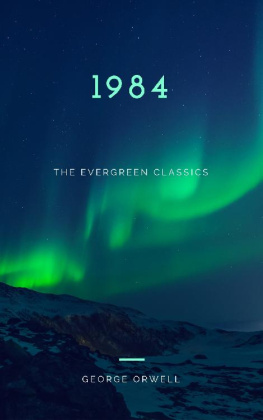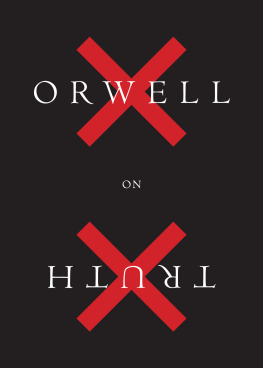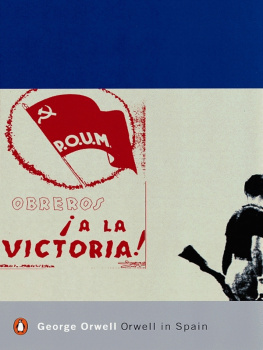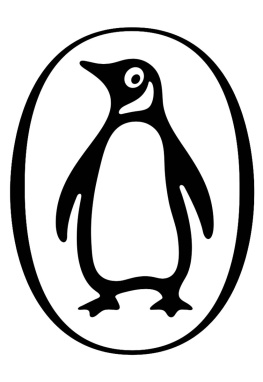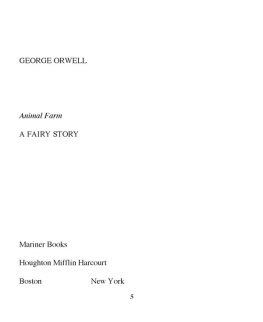The Orwell Tapes
Conceived and compiled by Stephen Wadhams
Foreword by Peter Davison
Introduction by George Woodcock
Based on interviews recorded for the CanadianBroadcasting Corporation, edited selections of which were broadcastin the 2016 radio program The Orwell Tapes and the 1984 radioprogram George Orwell: A Radio Biography
Locarno Press
Vancouver
Copyright
Published in 2017 by Locarno Press,Vancouver, Canada
locarnopress.com
First published worldwide by Penguin Canadain 1984
Text Stephen Wadhams and interviewees, 1984& 2017
All rights reserved. No part of thispublication may be reproduced, stored in a retrieval system, ortransmitted, in any form or by any means, electronic, mechanical,photocopying, recording or otherwise, without the writtenpermission of the publisher. The publisher does not have anycontrol over and does not assume any responsibility for author orthird-party websites or their content.
CIP Data available from Library and ArchivesCanada
ISBN 978-0-9959946-5-2
We gratefully acknowledge for their financialsupport of our publishing program the Canada Council for the Arts,the BC Arts Council, and the Government of Canada through theCanada Book Fund (CBF).
Cover and interior design by NaomiMacDougall
Edited by David Kilgour and ScottSteedman
To Deb
Contents
by Peter Davison
by George Woodcock
Baby Eric
St. Cyprians
Twin Souls
Eton
Burma
Southwold
Grandma and Grandpa and Uncle Eric
A Man from Another World
Paris
You Must Meet Literary People
The Adelphi
The Best Teacher I Remember
Booklovers Corner
Wigan Pier
I Was Always Sorry that Eileen MarriedGeorge
I Have Seen Wonderful Things
All Hope Gone
Homage to Catalonia
Preston Hall
Wallington in Wartime
The Lion and the Unicorn
At the BBC
They Led a Pleasant Life Together
Im Writing a Kind of Parable
Tribune
She Was a Good Old Stick
There Was Something in Him Which WelcomedDiscomfort
Animal Farm
Do You Think You Could Care for Me?
Jura
Ricky
His One Desire Is to Get This BookFinished
Nothing Ever Dies
I Suppose Everyone Will Be Horrified
Here Lies Eric Arthur Blair
Foreword
I have been working on Orwell, almost to theexclusion of everything else, for thirty-five years. It is strangehow the publication of the collected works, in August 1998, did notsignal the wrapping up of Orwell Studies instead they have takenoff into a world of their own, which seems to expand exponentially.Even for me, it is hard to keep up!
I am deeply indebted to Stephen Wadhams forthe book and the tapes he produced back in 1984. It is a clich tosay that too often the wrong books are remaindered. Of all thebooks devoted to George Orwell, especially around 1984, StephensRemembering Orwell here reissued as The Orwell Tapes was one ofthe very best. I can honestly say it is one of the shining lightsin all the welter of books, articles, and website contributionsthat have followed it. This reissue should be welcomed by bothscholars and those seeking an introduction to Orwell as a man andone of the twentieth centurys most significant writers. It alsobenefits from an excellent introduction by George Woodcock, whoskillfully provides a background for the many reflections recordedby Wadhams.
The personal reminiscences and analyses foundin The Orwell Tapes are still as fresh as when they were made. Topick one, almost at random: that by Henry Swanzy (I say almost atrandom because I drew attention to it in a footnote to Orwellstime at the BBC in The Complete Works of George Orwell, vol. XIII,p. 9). What struck me all those years ago still does on re-readingit today. Swanzy picks out Orwells unique personal characteristicsand highlights the mans essential kindness and to use a traitOrwell admired decency. Swanzy writes about Orwell with a lighttouch tinged with humour and marked by affection. And he gives arare insight into Orwell at home with Eileen, his wife. He alsonotes Orwells gift for making a picture and creating a scenario,as he puts it, which did not always quite coincide with reality.And, ahead of his time, he likens Orwell to Solzhenitsyn. Perhapswere he writing today he might have likened him to another greatRussian author and journalist, Vasily Grossman.
Inevitably there are minor errors forexample, we now know that Gollancz did not arm Orwell with a largeadvance to research the poverty of Lancashire colliers, and someexplication would be helpful for apparent contradictions, e.g.,that Orwell went to Spain to fight and that he went to write(although both statements are correct).
But what stands out is how brilliantly TheOrwell Tapes has stood the test of time. It can be wholeheartedlyrecommended to a later generation of lovers of Orwell and hiswork.
Peter Davison
London, December 2016
Back to
Preface
"The very concept of objective truth isfading out of the world. Lies will pass into history.
George Orwell
We have always needed George Orwell but nowwe may need him more than ever, as the idea of truth itself isundermined by "fake news," "alternative facts," a declining respectfor a rule of law based on facts and evidence, and the polarizationof political discourse stoked by politicians promising simplesolutions to complex problems.
Two plus two is four, cried Winston Smithin Nineteen Eighty-Four as his torturers tried to make him believeotherwise. Orwell knew very well where the manipulation of truthand the malignant distortion of language can lead. He'd seen it forhimself in the Spanish Civil War and even done it himself as a BBCproducer in wartime London, matching German propaganda with lies ofhis own, discovering the seductive power of being freed from normalconstraints of truth telling: One rapidly becomes propagandaminded and develops a cunning one didn't previously have, he wrotewith perhaps a hint of pride. Orwell wasn't a saint. He was apolitical writer, trying to convince. Many of his friends, even hispublisher, took him to task for overstating the facts, oroversimplifying them to get his message across. His workingdefinition of truth is intriguing. If what he wrote, he said, wasessentially true, then it met the test.
Not all facts can be easily or reliablychecked and almost all are open to interpretation. If truth isflexible then in the end it comes down to trust, the true bedrockof a free society. Trust in the integrity and honesty of the writerand, in the larger arena, trust in leaders and power holders.Delegate but verify. Trust, but keep your eyes open. Who willguard the guardians? asked a Roman poet. Who will watch thewatchers? The price of liberty, we are reminded, is eternalvigilance. And courage. If liberty means anything at all, saidOrwell, It means the right to tell people what they do not want tohear. It doesn't get much clearer than that.
Orwell lived in an age of tyranny Hitlerand Stalin and his greatest fear was that even in countries witha strong democratic tradition people might lose their taste forfreedom. Or have it crushed out of them. "Big Brother is watchingyou" is the most powerful message of his most powerful book, hismost potent and prescient warning about the abuse of power.
Imagine if Big Brother had today'stechnology. Today if Winston Smith and Julia tried to escape intothe woods and fields of the countryside to avoid detection they'dbe spotted by satellite imagery, heat-sensing technology or a dronehovering around the trees. Or betrayed by a small object in apocket or a purse. "Who here has an iPhone" asked Wikileaks founderJulian Assange, "who here has a Blackberry, who uses gmail? Wellyou're all screwed." If a landline is bugged we'd consider it anoutrage, yet we seem to accept that in the digital world, ourcommunications can be monitored and hacked. Even in real time, infront of our eyes. Not long ago a British journalist was amazed tofind that whenever he typed anything critical of the AmericanNational Security Agency and the mass collection of data somethingstrange happened: "the paragraph I had just written began toself-delete, gobbling text. I watched my words vanish." "GeorgeOrwell warned us of the danger of worldwide mass surveillance,said Edward Snowden; a child born today will grow up with noconception of privacy, they'll never know what it means to have aprivate moment to themselves, an unrecorded, unanalyzedthought.

